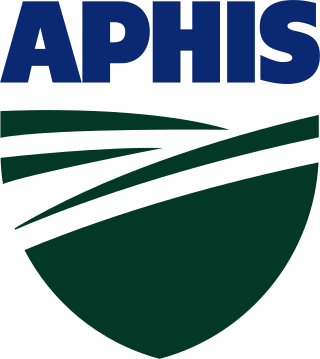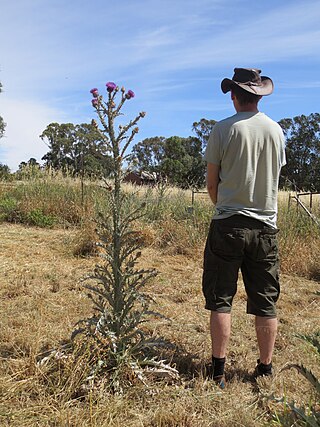| Agency overview | |
|---|---|
| Formed | 1919 |
| Jurisdiction | Government of Idaho |
| Headquarters | 2270 Old Penitentiary Rd Boise, Idaho 43°36′10″N116°09′57″W / 43.60274°N 116.16571°W |
| Agency executive |
|
| Website | agri |
Idaho Department of Agriculture is a state-level government agency of Idaho, responsible for managing agricultural services and policy. The department tasked with regulating food safety standards, licensing, the Invasive Species Program, and animal industries. [1] The department was founded in 1919. [2] It frequently collaborates with the United States Department of Agriculture and Bureau of Land Management. [3]

The Animal and Plant Health Inspection Service (APHIS) is an agency of the United States Department of Agriculture (USDA) based in Riverdale, Maryland responsible for protecting animal health, animal welfare, and plant health. APHIS is the lead agency for collaboration with other agencies to protect U.S. agriculture from invasive pests and diseases. APHIS's PPQ is the National Plant Protection Organization for the U.S., and the agency's head of veterinary services/veterinary Deputy Administrator is the Chief Veterinary Officer of the United States.
Agriculture and Agri-Food Canada is the department of the Government of Canada responsible for the federal regulation of agriculture, including policies governing the production, processing, and marketing of all farm, food, and agri-based products. Agriculture in Canada is a shared jurisdiction and the department works with the provinces and territories in the development and delivery of policies and programs.

The Kansas Department of Agriculture is a department of the government of Kansas under the Governor of Kansas. It is responsible for providing services and expertise that promote and protect Kansas' food supply and natural resources while stimulating economic growth. The head of the Department is the Secretary of Agriculture, who is appointed by the Governor, with the approval of the Kansas Senate.
The Agricultural Marketing Service (AMS) is an agency of the United States Department of Agriculture; it maintains programs in five commodity areas: cotton and tobacco; dairy; fruit and vegetable; livestock and seed; and poultry. These programs provide testing, standardization, grading and market news services for those commodities, and oversee marketing agreements and orders, administer research and promotion programs, and purchase commodities for federal food programs. The AMS enforces certain federal laws such as the Perishable Agricultural Commodities Act and the Federal Seed Act. The AMS budget is $1.2 billion. It is headquartered in the Jamie L. Whitten Building in Washington, D.C.

A noxious weed, harmful weed or injurious weed is a weed that has been designated by an agricultural or other governing authority as a plant that is injurious to agricultural or horticultural crops, natural habitats or ecosystems, or humans or livestock. Most noxious weeds have been introduced into an ecosystem by ignorance, mismanagement, or accident. Some noxious weeds are native. Typically they are plants that grow aggressively, multiply quickly without natural controls, and display adverse effects through contact or ingestion. Noxious weeds are a large problem in many parts of the world, greatly affecting areas of agriculture, forest management, nature reserves, parks and other open space.

The University of Florida Institute of Food and Agricultural Sciences (UF/IFAS) is a teaching, research and Extension scientific organization focused on agriculture and natural resources. It is a partnership of federal, state, and county governments that includes an Extension office in each of Florida's 67 counties, 12 off-campus research and education centers, five demonstration units, the University of Florida College of Agricultural and Life Sciences, three 4-H camps, portions of the UF College of Veterinary Medicine, the Florida Sea Grant program, the Emerging Pathogens Institute, the UF Water Institute and the UF Genetics Institute.
Title 7 of the United States Code outlines the role of agriculture in the United States Code.

Food safety in China is a widespread concern for the country's agricultural industry. China's principal crops are rice, corn, wheat, soybeans, and cotton in addition to apples and other fruits and vegetables. China's principal livestock products include pork, beef, dairy, and eggs. The Chinese government oversees agricultural production as well as the manufacture of food packaging, containers, chemical additives, drug production, and business regulation. In recent years, the Chinese government attempted to consolidate food safety regulation with the creation of the State Food and Drug Administration of China in 2003; officials have also been under increasing public and international pressure to solve food safety problems. Chinese Vice Premier Li Keqiang said, "Food is essential, and safety should be a top priority. Food safety is closely related to people's lives and health and economic development and social harmony," at a State Council meeting in Beijing.
The Smuggling Interdiction and Trade Compliance Program is a component of the United States Department of Agriculture (USDA) Animal and Plant Health Inspection Service (APHIS), Plant Protection and Quarantine (PPQ). The mission of the Smuggling Interdiction and Trade Compliance Program is to detect and prevent the unlawful entry and distribution of prohibited and/or non-compliant products that may harbor exotic plant and animal pests, diseases or invasive species.

The California Department of Food and Agriculture (CDFA) is a cabinet-level agency in the government of California. Established in 1919 by the California State Legislature and signed into law by Governor William Stephens, the Department of Food and Agriculture is responsible for ensuring the state's food safety, the protection of the state's agriculture from invasive species, and promoting the California agricultural industry.
President Chester A. Arthur signed the Animal Industry Act on May 29, 1884 creating the Bureau of Animal Industry (BAI), an organization that was established under the United States Department of Agriculture. It replaced the Veterinary Division that had been created by the Commissioner of Agriculture in 1883, which had taken over for the Treasury Cattle Commission, Department of Treasury.

Invasive species are a significant threat to many native habitats and species of the United States and a significant cost to agriculture, forestry, and recreation. The term "invasive species" can refer to introduced/naturalized species, feral species, or introduced diseases. Some introduced species, such as the dandelion, do not cause significant economic or ecologic damage and are not widely considered as invasive. Economic damages associated with invasive species' effects and control costs are estimated at $120 billion per year.

The Food Safety and Inspection Service (FSIS), an agency of the United States Department of Agriculture (USDA), is the public health regulatory agency responsible for ensuring that United States' commercial supply of meat, poultry, and egg products is safe, wholesome, and correctly labeled and packaged. The FSIS draws its authority from the Federal Meat Inspection Act of 1906, the Poultry Products Inspection Act of 1957 and the Egg Products Inspection Act of 1970. The FSIS also acts as a national health department and is responsible for the safety of public food-related establishments as well as business investigation.
Biosecurity in the United States is governed by the Bureau of Western Hemisphere Affairs, which is part of the US Department of State. It obtains guidance and advice on specific matters relating to biosecurity from various other government agencies.
Plant Protection and Quarantine (PPQ) is one of six operational program units within the Animal and Plant Health Inspection Service (APHIS) of the United States Department of Agriculture (USDA). The PPQ works to safeguard agriculture and natural resources in the U.S. against the entry, establishment, and spread of animal and plant pests, and noxious weeds in order to help ensure the protection of native flora and an abundant, high-quality, and varied food supply.

The Ministry of Agriculture, Food and Rural Affairs is a cabinet-level division of the government of South Korea. It is headquartered in the Sejong Government Complex in Sejong City. It was established as Ministry of Agriculture, with the founding of the First Republic of Korea in 1948.
The Australian Department of Agriculture, Water and the Environment (DAWE) was an Australian Government department which operated from 1 February 2020 until 30 June 2022. It represented Australia's national interests in agriculture, water and the environment.
In December 2018, the United Nations General Assembly adopted a Resolution declaring 2020 as the International Year of Plant Health (IYPH). The purpose of the IYPH was to raise global awareness on how protecting plant health can help end hunger, reduce poverty, protect the environment, and boost economic development.
The Nevada State Department of Agriculture is the department of the Nevada State government responsible for managing the welfare of Nevada citizens and regulating Nevada's agriculture and related industries.